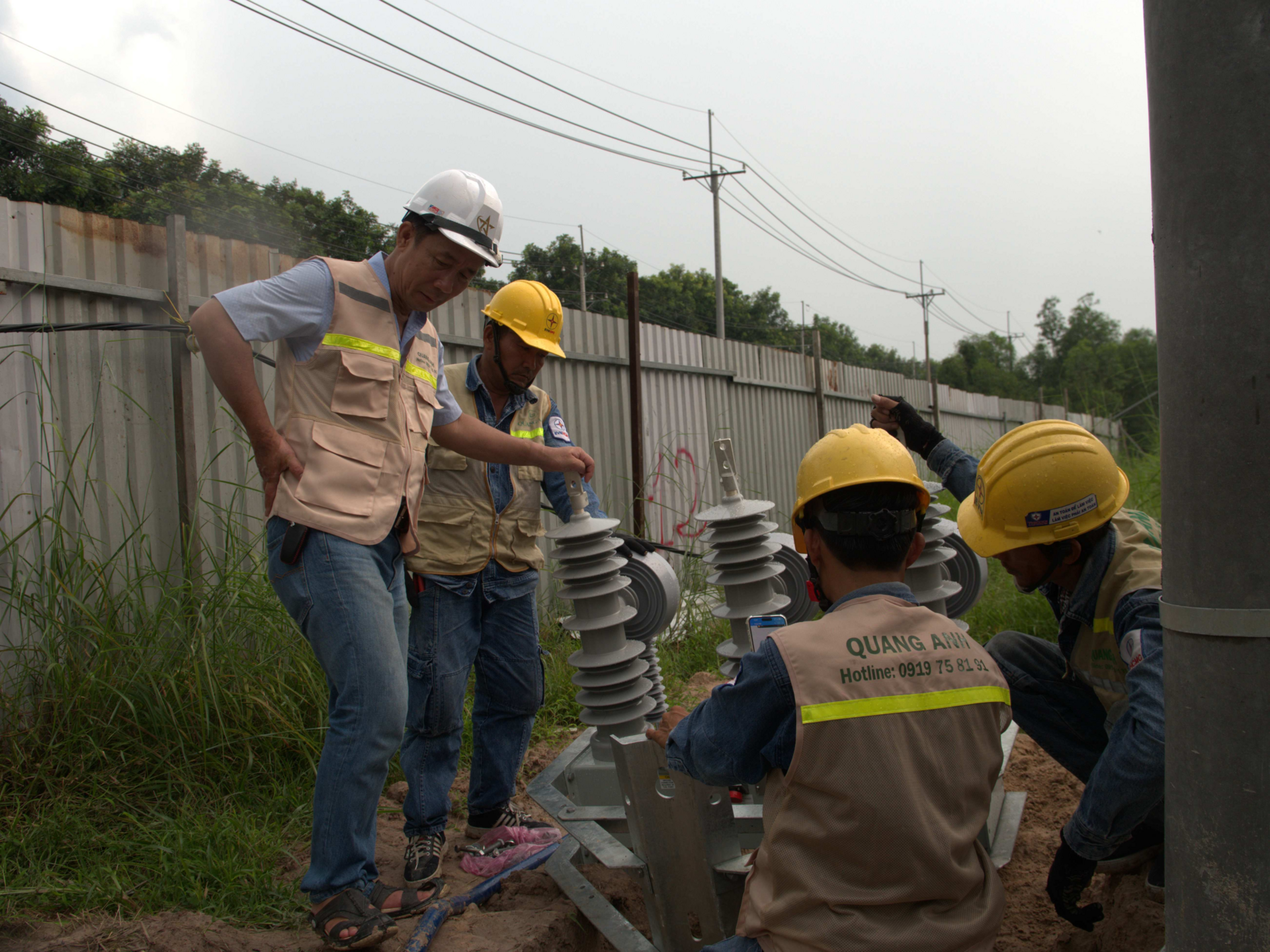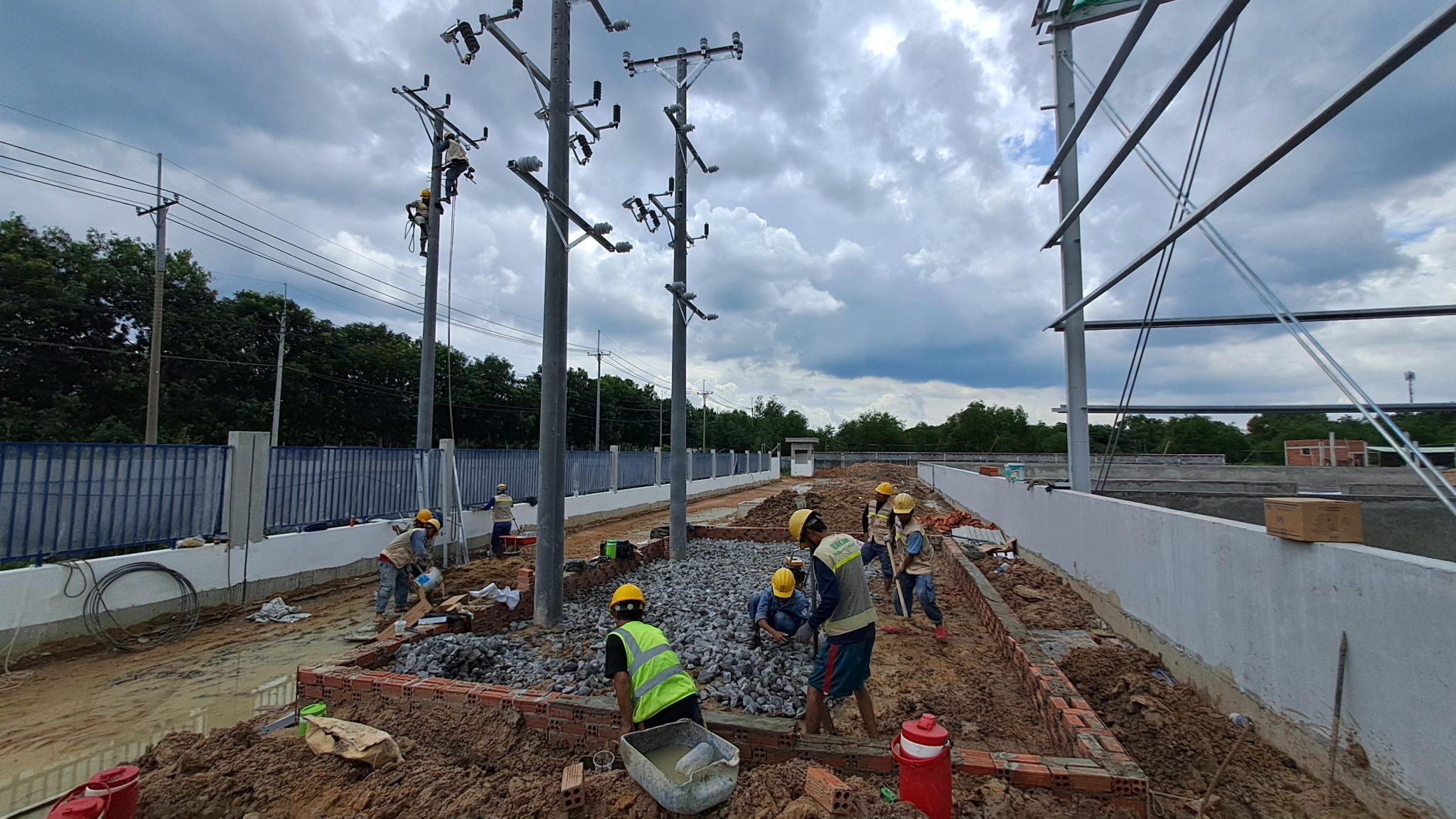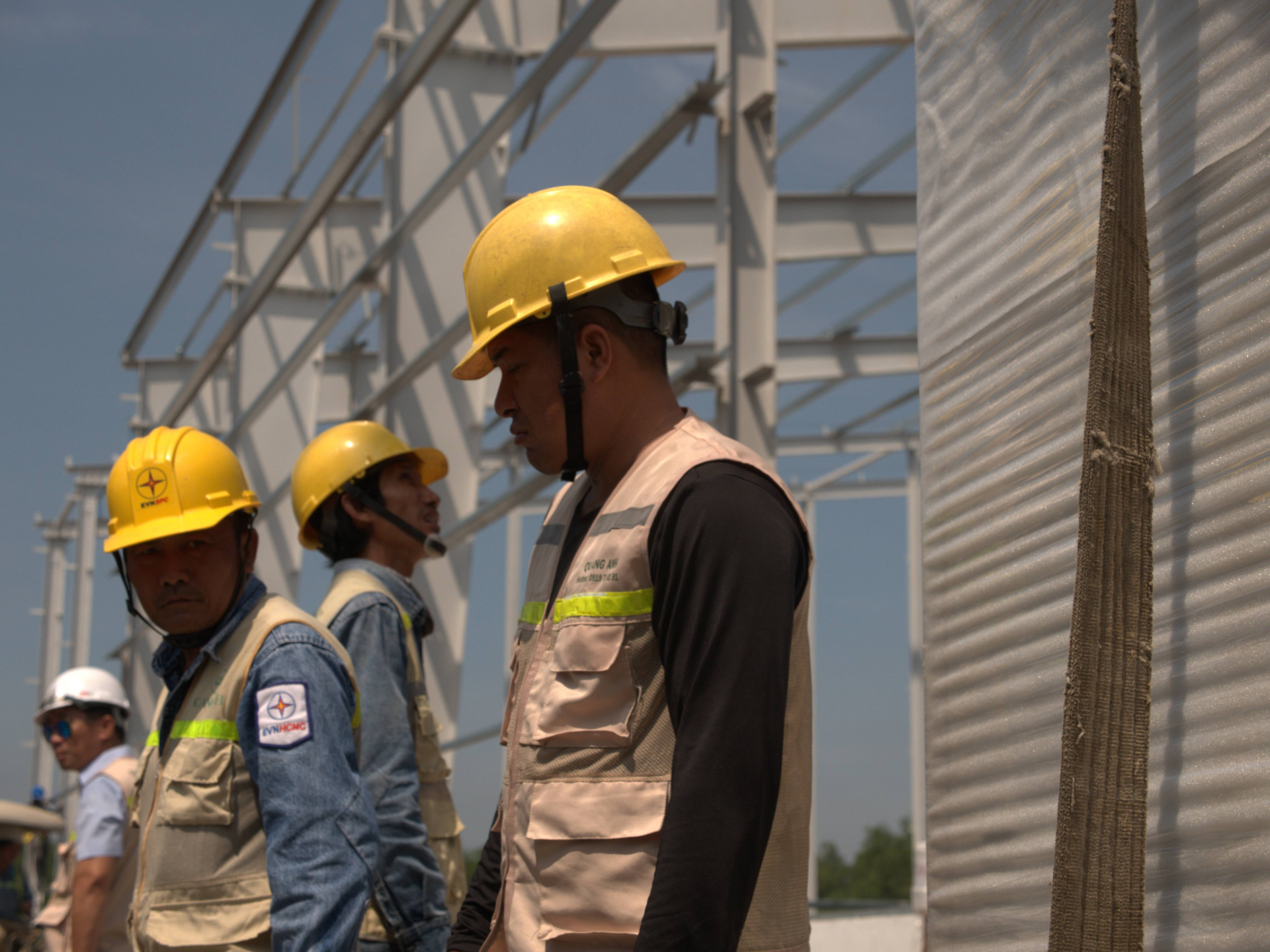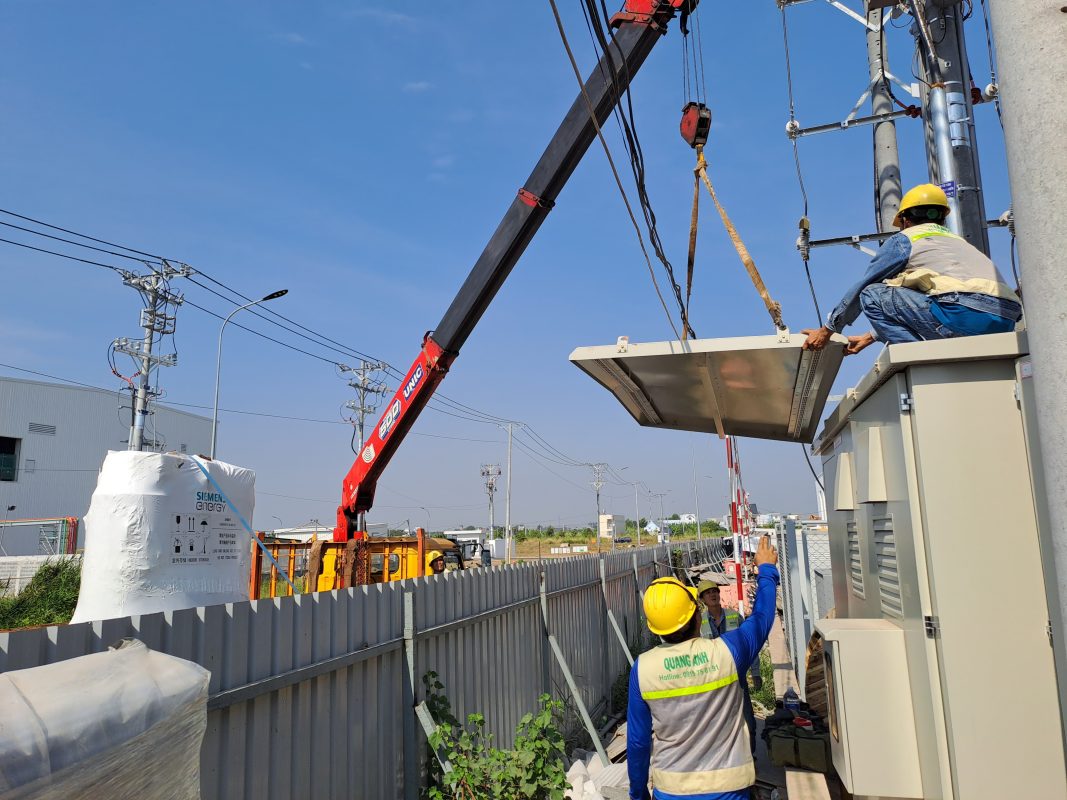An industrial construction contractor is responsible for overseeing, organizing, and completing industrial projects from design to operation while ensuring timely delivery, quality, and safety.
Managing and Structuring Industrial Project Execution
An industrial construction contractor ensures comprehensive management, covering timeline, cost, and quality to meet investment requirements and handover plans. Through integrated project management, investors can have confidence in synchronized construction processes, minimizing cost and time risks.
In the process of managing construction projects, executing industrial buildings demands adherence to international standard project management processes, like ISO 21500:2012. These crucial steps guarantee on-time delivery, quality control, and comprehensive project risk management.
-
Initiating the Project: This initial phase defines clear objectives, scope, and strategic vision. Creating a Project Charter serves as a foundational link among stakeholders, analyzing execution feasibility, and potential risks.
-
Planning the Project: This involves detailing tasks, estimating resources, and budgeting. A detailed execution plan is created to assure feasibility and agreement, forming the foundation for industrial contractors to efficiently meet set goals.
-
Implementing, Executing the Project: At this stage, real construction is undertaken with timely deployment of manpower and resources. Close coordination between departments and on-site supervision is essential for precise quality control.
-
Monitoring and Controlling the Project: Tight monitoring and evaluation of progress, quality, and costs help make timely adjustments. This control ensures projects stay on track and risks are effectively managed.
-
Completing the Project: Upon project completion, final inspections and handover are conducted. The entire construction process is summarized, evaluated, and lessons learned are recorded to enhance future project processes.
Key factors in managing and structuring project execution include:
- Clearly defined roles and responsibilities among all project participants.
- Detailed planning based on technical analysis and field realities.
- Continuous financial and resource control to prevent wastage.
- Risk management with contingency plans for unexpected situations.
- Quality supervision and labor safety to meet technical standards.
- Effective communication among stakeholders to promptly address issues.
By synthesizing these processes and principles, industrial construction projects are executed efficiently, meeting timelines, ensuring quality, and optimizing costs.

Design and Technology in Industrial Construction
Industrial construction contractors offer comprehensive design and build services. They apply modern technology such as intelligent M&E systems and green technology to optimize energy and operations. This leads to more efficient and cost-effective factory operations over the long term.
Today’s industrial construction design and technology have reached significant advancements, especially in efficiency optimization and sustainable development. This progress is evident through the use of modern technologies such as AI, IoT, Building Information Modeling (BIM), new construction methods, and green building materials.
A standout feature is the application of AI and IoT in managing construction schedules, automating energy monitoring, maintenance, and security. This results in higher operational efficiency and substantially reduced costs. Construction companies are leveraging BIM technology to create 3D digital models of projects. This not only aids in design phases but also minimizes construction and maintenance errors.
Moreover, the use of green building materials like recycled concrete and ecological bricks is encouraged. This is part of efforts to decrease carbon emissions and increase recyclability, aligning with green industrial development goals. Advanced construction methods like modular building and 3D printing are also widely adopted. These methods significantly cut construction time by up to 50% and reduce labor demand.
Contemporary industrial design also emphasizes integrating renewable energy technologies like solar and wind. These energy-saving solutions help reduce operational costs and enhance overall energy efficiency. Additionally, digital transformation through project management software and IoT sensors is enhancing smart construction management, especially focusing on labor safety and quality control.
In modern development contexts, sustainability and eco-friendliness are prioritized to achieve green building standards. These innovations are expected to continue to grow robustly, creating breakthroughs in the industrial construction sector by 2025.

Support and Warranty for Industrial Projects
Many industrial construction contractors are committed to providing ongoing customer support even after project completion. They offer after-sales and warranty services, minimizing operational and maintenance issues and reducing investment risks, ensuring long-term stability of the structure.
Support and warranty for industrial projects are crucial factors in project management and operations, ensuring performance and reliability throughout the project lifecycle.
Construction Warranty Regulations
Construction warranties are the contractor’s responsibility under the Construction Law 2014 and Decree 06/2021/ND-CP. Specifically, warranty periods vary based on construction grade and funding source:
- Special and Grade I structures: Minimum 24 months for projects using public funds or state resources outside public investment.
- Other grade structures: Minimum 12 months warranty.
- Technological equipment: Warranty duration as per contractual agreement, not shorter than the manufacturer’s warranty period.
Warranty contracts must clearly define rights and responsibilities, forms of warranty, and methods for defect resolution.
Industrial Warranty Process
The industrial warranty process includes:
- Reporting defects from the owner to the investor, requiring the contractor to perform warranty actions.
- The contractor takes responsibility for costs and warranty execution, with the right to refuse if the defect is outside their responsibility or control.
- The investor inspects and accepts the warranty repairs once completed.
Technical Support and Incident Management
Technical project support is integral to the warranty process. This includes detailed warranty planning, ensuring continuous system operation, and rapid response to incidents. Contractors must quickly dispatch experts to resolve issues upon notification.
Warranty Guarantee
A warranty guarantee ensures the contractor fulfills warranty obligations on time. Banks like Techcombank often issue these guarantees under specific conditions.
Project Warranty Responsibilities
- Contractor: Primarily responsible for construction warranties.
- Investor: Has the right to request, inspect, and accept warranty services.
- Owner/Facility Manager: Coordinates and confirms during the warranty phase.
Support and warranty services play a crucial role, ensuring the project’s completion still adheres to high operational standards and complies with established construction warranty regulations.

Industrial construction contractors optimize costs, timelines, and quality for industrial projects. Integrated management and sustained support assure investors of minimized risks and enhanced project performance.
For more information about our services, please contact QuangAnhcons – Hotline: +84 9 1975 8191.
QuangAnhcons provides industrial construction contractor services, ensuring comprehensive project management from design through execution and long-term support after project completion.
[contact-form-7 id="7239967" title="Contact form 1"]


Related Posts
Tay Ninh Solar Power Planning: Technical Framework, Grid Interconnection, and Rollout Roadmap
Technical overview of solar planning in Tay Ninh: irradiation, grid capacity, permitting, design, operations, and [...]
Dec
Binh Duong Solar Planning: Regulatory Framework, Grid Interconnection, and an Implementation Roadmap for Factories and Industrial Parks
An overview of Binh Duong solar planning: legal framework, interconnection, design, risk management, and an [...]
Dec
Solar Farm Repair: O&M Workflow, IV Curve Diagnostics, Thermography, Inverter Service and Utility-Scale Safety
A utility-scale solar farm repair plan centered on O&M, IV curves, thermal imaging, inverter service, [...]
Dec
Dong Nai Solar Power Plan 2023–2025: Tri An 1,029 MW, Grid Upgrades and the DPPA Pathway
A complete look at Dong Nai’s solar power plan: Tri An 1,029 MW, irradiation potential, [...]
Nov
Quang Ngai Solar Power Plan 2024–2030: Legal Framework, Irradiance Potential, and Development Roadmap
A complete look at Quang Ngai’s solar power plan: capacity targets, irradiance (PVout), development zones, [...]
Nov
Solar Damage Assessment Services: On-Site Procedures, EL/IV/Thermography Testing & Compliance with Standards
Discover IEC/UL/NEC standard solar damage assessment processes: on-site evaluation, EL and IV curve testing, thermal [...]
Nov
Comprehensive Package Estimate for a 1800MVA 500kV Substation: Scope, Configuration 3x600MVA, Standards and Timeline Management
An overview of the 1800MVA 500kV substation estimate: construction scope, configuration 3x600MVA, GIS/AIS, SCADA, standards, [...]
Nov
Factory Electrical Systems: Comprehensive Design and Implementation Guide
Discover the detailed and safe process of factory electrical systems design and implementation. [...]
Oct
Blueprints Required for Factory Construction Permits
Discover the necessary blueprints in factory construction permit applications, from floor plans to electrical and [...]
Oct
What Are the Requirements for a Factory Construction Permit? A Comprehensive Guide
Explore the documentation and steps needed to secure a factory construction permit for streamlined project [...]
Oct
Factory Construction Permit Procedures in Vietnam: Essential Guidelines and Documents
Learn the procedures for securing a factory construction permit in Vietnam, focusing on document preparation [...]
Oct
Key Steps in the Factory Construction Process
Discover the essential steps and requirements for building factories. [...]
Oct
Comprehensive Electrical Substation Solutions by Quanganhcons
Discover the cutting-edge electrical substation solutions offered by Quanganhcons for industrial applications. [...]
Oct
Investment Costs for a 1MWp Solar Power System and Influencing Factors
Explore the investment costs for a 1MWp solar power system in Vietnam and the influencing [...]
Sep
QuangAnhcons: Elevating Wind Energy Solutions
Explore QuangAnhcons' leadership in wind energy and renewable solutions in Vietnam. [...]
Sep
Electrical Contractor Strategies at Becamex Industrial Park
Discover the strategic advancements and partnerships of the electrical contractor at Becamex Industrial Park. [...]
Sep
Investment Insights for 1MW Wind Energy in Vietnam: Costs and Opportunities
Discover the detailed analysis of costs and opportunities for investing in 1MW wind energy projects [...]
Sep
Advanced Electrical Installation Solutions by QuangAnhcons
Explore advanced electrical installation solutions and modern technology with QuangAnhcons. [...]
Sep
Enhancing Industrial Electrical Services with Quanganhcons
Discover Quanganhcons' expertise in industrial electrical services, offering efficient and sustainable power systems. [...]
Sep
Comprehensive MEP Solutions by QuangAnhcons: From Design to Maintenance Excellence
Discover optimal MEP solutions with QuangAnhcons, dedicated to excellence from design through maintenance. [...]
Sep